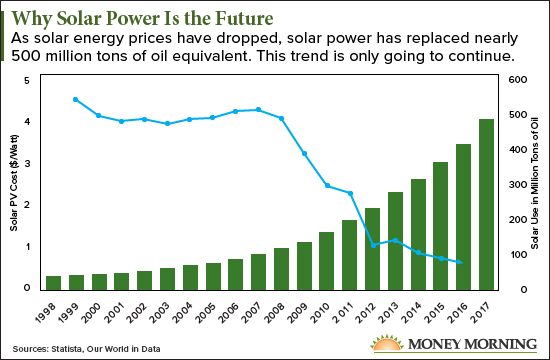This site uses Akismet to reduce spam. Learn how your comment data is processed.
Oil prices may never reach their spectacular highs in 2008 again, and the reason is less obvious than you might think. And this subtle new trend could make OPEC completely irrelevant.
But that isn't the most important consequence. How energy companies respond to what's happening will be the difference between owning profitable stocks and clunkers.
In fact, once you see the chart below, you'll never want to own a share of Exxon Mobil stock again…
Say Goodbye to Permanently High Oil PricesOil is always going to be part of the global energy mix, but investors hoping to cash in on another decade of $100 oil are going to be disappointed.
WTI crude oil surged from a mere $13 a barrel in 1999 to an average $100 a barrel in 2014, including a 2008 peak of over $130 a barrel. That surge in price may have hurt Americans at the gas pump, but it made oil investors a fortune. Between 1999 and 2014, shares of Exxon Mobil Corp. (NYSE: XOM) surged 170%.
But the good times are coming to an end for America's largest oil company.
$1 Cash Course: Tom Gentile is offering a rare opportunity to learn how to amass a constant stream of extra cash – year after year. And he's going to teach you how to do it entirely on your own. Learn more…
Oil prices plunged from $106 a barrel in 2014 to a mere $27 a barrel in 2016, a 75% collapse. While oil has rallied since then, largely thanks to a concerted effort by OPEC to restrict oil supply to drive prices higher, the era of $100 a barrel oil is over.
And there's nothing OPEC or Saudi Arabia can do to push prices into the stratosphere again.
That's a bad sign for Exxon stock, but the reason for OPEC's obsolescence is actually a profit opportunity for savvy investors.
OPEC Can't Stop This TrendThe law of supply and demand has always governed oil prices, but OPEC can only manipulate supply.
When the oil cartel wants higher oil prices, they simply band together to cut the supply.
What OPEC (or any oil-producing country) can't control is demand. And that's where we're starting to see the biggest change.
In reality, it could explain more about the declining oil price since 2014 than the surge in supply. Oil production has only grown by about 10 million barrels per day over the last decade.
But renewable energy is quickly chipping away at oil demand, especially as the cost of renewable energy continues to fall.
Take a look at the chart below. Solar power has created nearly 500 million tons of oil equivalent in 2017 alone as solar power prices continue to plunge.

While 500 million tons of oil equivalent translates to about 3.4 million barrels of oil, that's 11% of total oil production. But that 3.4 million barrels of oil wipes out more than a third of oil production's growth over the last decade.
And this is just the start of the trend.
As the cost of renewable energy continues to fall, production will continue to soar. EIA estimates that solar power production alone will surge by over 500% by 2040. That's going to continue to create less demand for oil.
It gets even worse for oil too.
You might think oil demand has a major cushion because it's used for gasoline. In fact, gasoline is the top use for crude oil. But the IEA predicts there will be 125 million electric vehicles on the road by 2030. That's an astonishing 3,932% more electric vehicles than are on the road today.
This will all come at the expense of oil demand. Petroleum is already the least popular source of electric power generation, and natural gas and renewables are now the cheapest source of new energy in the United States.
Oil demand simply can't keep up with these rapid technological changes.
And that's exactly why investors should steer clear of Exxon stock.
Here's the giant mistake Exxon is making – and how you can double your money in a year with an oil company adjusting to the new reality…
Why Exxon Stock Is a Bad BetJoin the conversation. Click here to jump to comments…
No comments:
Post a Comment